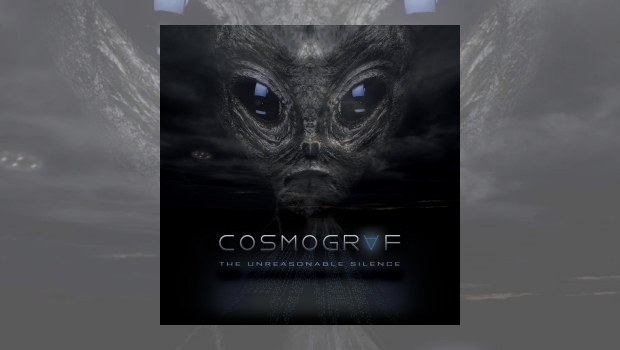As we approach the end of the year we start to look back at stand out albums of the year, and wonder if our initial thoughts about a newly released album will stand up to scrutiny after a significant period when the initial excitement has dissipated. A few months after it landed on our planet we ask ourselves the question:
The Unreasonable Silence – is it any good?
The answer?
It’s simply stunning. Robin Armstrong has conjured a rich narrative coupled with sonic brilliance. The imaginative story is unnerving whilst the music is captivating on a human level but cinematic in scope – ranging from crunching Deep Purple riffs, through atmospheric acoustic passages to sweeping Floydian soundscapes.
There we have it in simple straightforward terms. I could go on to bore you with a track by track analysis of the album, but I will try to resist the temptation. I could even attempt to describe the captivating story line… but part of the fascination of this album is diving deep down into its depths to appreciate the finely honed music and intense lyrical ideas.
The Unreasonable Silence is the creation of talented multi-instrumentalist Robin Armstrong, a man who has previously explored some fascinating themes on his previous albums through impressive imagination and skilled musicianship; When Age has Done Its Duty presented an emotional insight into dementia and loss. The marvellous The Man Left in Space was a dramatic but very human sci-fi tale inspired by David Bowie. The rather gothic Capacitor took us into the spirit world of ghost stories, and now The Unreasonable Silence evocatively describes an enigmatic tale of alien abduction or mental breakdown… or possibly both? I think the answer is hinted at in the last second of the album, but my suggestion is that it’s worth trying to work it out for yourself.
It may be interesting to note that due to Armstrong’s interest in and work with timepieces, his Cosmograf project is named after a high quality Rolex watch. The intricate precision, craftsmanship and stylish design that goes into such a device is reflected in the pristine sonic production and the skilfully designed soundscapes Armstrong creates. The attention to detail is remarkable, but importantly this attention is not an academic indulgence, and serves to underline the emotion and feeling of the songs and story line.
There are many highlights in this album of consistently high quality, including the scene setting This Film Might Change Your Life which segues into the haunting Plastic Men over the background noises of a vintage American sci-fi film on TV. There are inevitable comparisons with Roger Waters in the tone of Armstrong’s singing voice and the imaginative uses of samples and sound effects to illustrate the narrative, but this is no pale Pink Floyd imitation. The quality just gets better and better with my personal favourite of the whole piece, the powerful Arcade Machine, in which Armstrong rocks out a la Deep Purple at times through his vocals and crunching guitars, backed up as he is throughout the album by the percussive brilliance of Big Big Train’s Nick D’Virgilio.
There you go… I promised not to do a track by track analysis and somehow in the first four songs I’ve touched upon three, some of the best here, such is the magnetic attraction of an album that has very rarely been away from my music devices in the last few months – I will be playing this one for many years to come, long after the ‘next great album’ by so many others has faded in my memory.
The eerie RGB calms things down atmospherically but gives no comfort as the story heads to darker places, Four Wall Euphoria taking us to another pinnacle of paranoia and menace, assorted character voices inhabiting the fringes of sanity before finishing rather abruptly to bleak effect. As the main character approaches his denouement the album sweeps more towards Floydian soundscapes and grandeur, punctuated with the sense of a real person falling apart at the seams in the face of his fractured mind. Over a majestic and captivating musical backdrop the impassioned and epic vocals of Rachael Hawnt in the final title track are astounding, giving this tremendous album an appropriately dramatic but human finale.
I am glad that I held back on reviewing this at the time of release as it has allowed me more time to absorb and enjoy this intricately put together album. It also allows me to be absolutely certain in my increasingly strongly held view that The Unreasonable Silence is undoubtedly a major contender for ‘Album of the Year’, from definitely one of the best Progressive Rock artists of this generation.
Only one last thing to say: If you have not yet got this album do yourself a favour and just go and get it. Enter the wonderful world of Cosmograf… who knows where he’s going next?
TRACK LISTING
01. Echo $abduction (2:20)
02. This Film Might Change Your Life (9:03)
03. Plastic Men (6:27)
04. Arcade Machine (8:37)
05. RGB (4:02)
06. Four Wall Euphoria (5:23)
07. The Uniform Road (7:20)
08. The Silent Field (2:15)
09. Relativity (4:48)
10. The Unreasonable Silence (9:08)
Total time – 59:23
MUSICIANS
Robin Armstrong – Vocals, Guitars, Keyboards, Bass
~ With:
Nick D’Virgilio – Drums (all tracks)
Nick Beggs – Bass Guitar (track 6)
Dave Meros – Bass Guitar (track 4)
Rachael Hawnt – Vocals (tracks 6,9 & 10)
Voices:
Redd Horrocks (tracks 3 & 6)
Josh at Racketsound (track 5)
Andrew Whelbig (track 2)
Martin Paine (track 7)
Linnea Sage (track 5)
Katharine Thompson (track 10)
Rhiannon Owens (track 7)
Martin Hutchinson (track 7)
David Thompson (track 7)
Steven Wilson (track 10)
Robin Armstrong
ADDITIONAL INFO
Record Label: Independent
Country of Origin: U.K.
Date of Release: 13th June 2016
DISCOGRAPHY
Capacitor (2014)
The Man Left in Space (2013)
When Age has Done it’s Duty (2011)
End of Ecclesia (2009)
Freed from the Anguish (2008)

